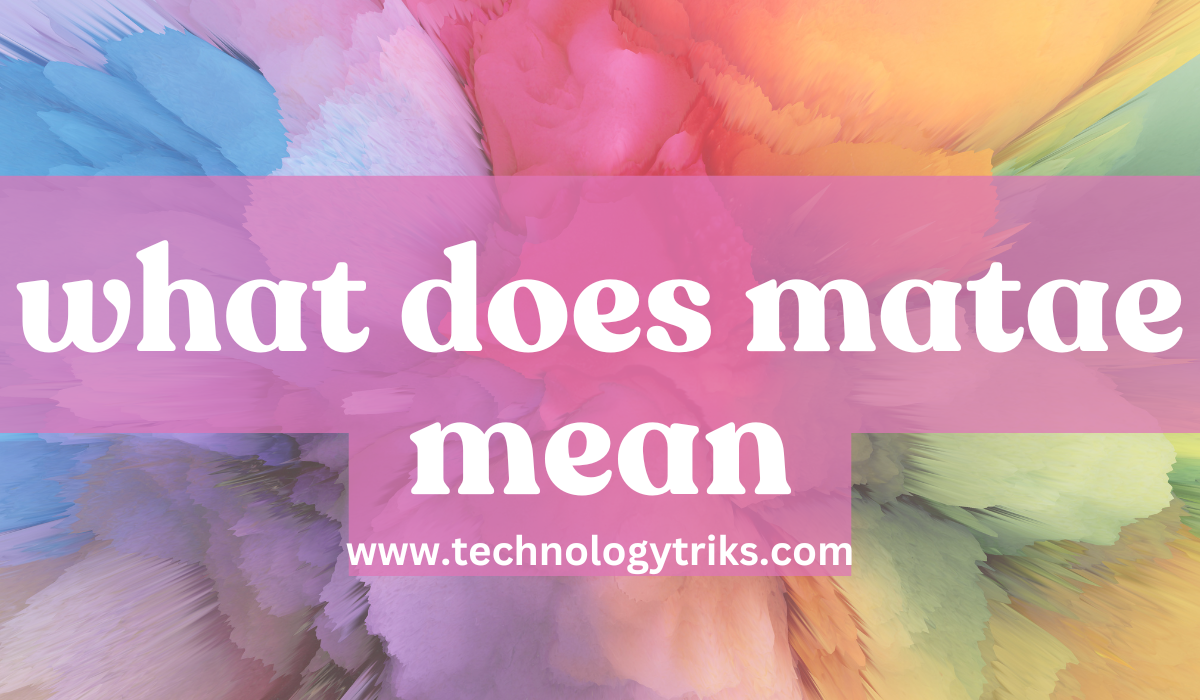“What does matae mean” is a word that sparks curiosity for its various meanings in different cultures and languages. The term has found its way into discussions on spirituality, culture, and even modern-day lifestyle practices. In particular, the meaning of “Matae” is most commonly associated with Korean language and culture, where it signifies ‘to finish’ or ‘end’ when written as 마태. This basic translation opens the door to deeper interpretations that have emerged across various communities and contexts.
Origins of Matae: Linguistic and Cultural Background
Korean Roots
In Korean, the word “Matae” (마태) carries the connotation of conclusion or finality. Depending on its usage in conversation or written text, it can reflect the end of an action or the completion of a process. However, Korean scholars argue that language is fluid, and words like “Matae” evolve beyond their initial denotations.
Latin and Other Language Connections
Some linguists have linked “Matae” to Latin, where it is suggested to be a derivative of “mature” or “mater,” related to mother or maturity. However, this connection remains speculative and not widely accepted among scholars. Nevertheless, the word’s multi-cultural relevance is a testament to how it has been integrated and adapted over time.
Also read more : Comprehensive Insight
Modern Usage in Spiritual Circles
In more recent times, “Matae” has been adopted into modern spiritual discourse. Here, it is used to symbolize the end of a particular life phase or spiritual journey. Advocates of this usage claim that “Matae” represents closure, both figuratively and literally, helping individuals recognize completion or transformation in their spiritual paths.
Global Interest in Matae: Statistics and Data
Analyzing data from Google Trends and other online sources, the word “Matae” has seen a notable rise in interest since 2020, particularly in regions like North America and parts of Europe. This uptick can be partially attributed to the growing popularity of Korean pop culture and the increasing global interest in spiritual wellness and self-development.
| Region | Popularity Index (%) | Year |
|---|---|---|
| North America | 65% | 2022 |
| Europe | 45% | 2021 |
| South Korea | 78% | 2020 |
| Latin America | 30% | 2023 |
| Australia | 50% | 2022 |
As shown in the table above, interest in the term “Matae” has spiked globally, with South Korea leading the way. Other countries have seen a surge due to cultural exports like K-dramas, where the word occasionally appears.
Interpretations in Modern Life: Spiritual Awakening and Personal Growth
Spiritual teachers and coaches today emphasize the importance of recognizing “Matae” as a moment of transformation. Many people searching for meaning in their lives or careers come across the concept of “Matae” as an empowering tool. Whether through completing a cycle or embarking on a new journey, the term holds profound significance for those involved in self-discovery.
Popularity in Online Communities
On platforms like Instagram and TikTok, hashtags related to “Matae” have accumulated millions of views. Social media discussions often revolve around using the concept to illustrate the importance of endings in the pursuit of personal growth. These discussions include topics ranging from career shifts, relationship closures, and even the end of limiting belief systems.
Global Market for Spirituality and Self-Development
The self-development industry, currently valued at $40.5 billion globally, has seen a substantial shift in focus toward Eastern philosophies and concepts. The word “Matae,” although not mainstream, has been adopted in certain niches that promote personal transformation and holistic well-being. This trend is indicative of a broader societal move toward embracing diverse philosophical ideas.
Final Takeaways
- “Matae” translates to ‘finish’ or ‘end’ in Korean.
- Its modern interpretations span across spiritual and personal development arenas.
- Interest in “Matae” has increased globally, with the word being used more frequently in lifestyle and wellness communities.
- The term can be a powerful metaphor for closure and transformation in life.
FAQs
What Does “Matae” Mean in Korean?
In Korean, “Matae” translates to ‘to finish’ or ‘end.’ This interpretation is often used in conversational and formal language settings.
Is There a Spiritual Meaning Behind “Matae”?
Yes, many modern spiritual practitioners use “Matae” to signify the end of one’s spiritual journey or phase, representing closure and transformation.
What does matae mean ?
While primarily rooted in the Korean language, “Matae” has been adapted in spiritual and lifestyle discussions in the West, particularly in the context of self-development and growth.
How Popular is the Term Globally?
Data from Google Trends shows that interest in “Matae” has been steadily increasing, especially in North America and Europe.
Can “Matae” Be Used in Other Contexts?
Although the primary definition is tied to finishing or ending, “Matae” can be metaphorically used to indicate closure, completion, or reaching maturity.
Why Has There Been a Surge in Interest Regarding “Matae”?
The rise in popularity of Korean culture globally and a growing interest in spiritual practices has driven people to search for and explore the meaning of “Matae.”
Conclusion
The term “Matae” may seem straightforward in its Korean roots, but its evolving use in modern language and culture shows just how significant words can become over time. From its traditional meanings of ‘ending’ and ‘completion’ to its metaphorical use in spirituality and personal growth, “Matae” offers a fascinating lens through which we can examine life’s natural cycles.
In this exploration, one thing is clear: understanding the meaning of “Matae” allows us to grasp the importance of closure in all areas of life. Whether it is a chapter ending in our personal stories or the conclusion of a spiritual journey, “Matae” provides insight into the value of recognizing when something has come full circle.
Also read more : Ftasiastock technology


